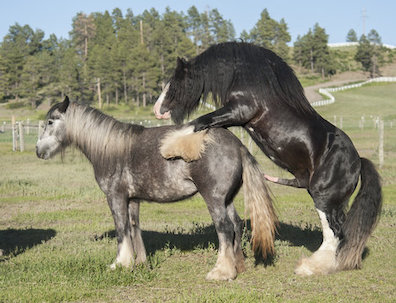In the midst of some less explicit sexual language in Sirens,
Bloom contemplates intercourse and orgasmic climax: "Tipping
her tepping her tapping her topping her. Tup. Pores to dilate
dilating. Tup. The joy the feel the warm the. Tup. To pour
o'er sluices pouring gushes. Flood, gush, flow, joygush,
tupthrob." The t-words, running through every vowel in the
language and concluding with repeated iterations of "tup," are
terms for animal copulation. It is very likely that Joyce was
remembering the last one from Shakespeare's Othello
and using it to intimate Bloom's anguish about an infidelity
whose time has come.
Gifford notes that "To 'tup' and to 'tip' mean
to copulate as a ram does. To 'top' means to cover as
an animal covers, and both 'tap' and 'tep' are
dialect variants of 'top'." Johnson repeats Gifford's findings
more or less verbatim, and Slote, Mamigonian, and Turner
confirm four of his five claims with quotations from the OED.
But none of these annotators mentions what is by far the most
memorable use of such diction in English-language literature.
In the opening scene of Othello Brabantio is roused
from bed by cries in the street:
'Zounds, sir, y' are robb'd! For shame, put on your
gown;
Your heart is burst, you have lost half your soul;
Even now, now, very now, an old black ram
Is tupping your white ewe. Arise, arise!
Awake the snorting citizens with the bell,
Or else the devil will make a grandsire of you.
(1.1.86-91)
Iago uses the image of a ram covering a ewe to excite
Brabantio's racist fears of the Moor's potent sexuality, his
exotic mentality, his beastly otherness. No doubt Bloom's
thoughts about tupping are more benign, prompted by happy
memories of intercourse with Molly, but it is inconceivable
that he is not also thinking of the adulterous acts about to
be performed, or perhaps already being performed—even now,
now, very now—in his home. Boylan, who has left the Ormond for
Eccles Street some minutes earlier, is what Ithaca
calls "a bodily and mental male organism specially adapted for
the superincumbent posture of energetic human copulation and
energetic piston and cylinder movement," and Bloom has been
incapable of satisfying Molly in that way for more than ten
years. Incidentally, he also resembles Brabantio in worrying
about his daughter becoming sexually active.
In Scylla and Chaybdis Stephen argues that all of
Shakespeare's works are preoccupied with the anguish of his
wife's infidelity. ("His unremitting intellect is the hornmad
Iago ceaselessly willing that the moor in him shall suffer.")
Iago's characterization of old black Othello animalistically
fucking young white Desdemona—an image that is hard to
unsee—surely is intended to enter readers' minds as Bloom
dwells four times on the word "tup."


